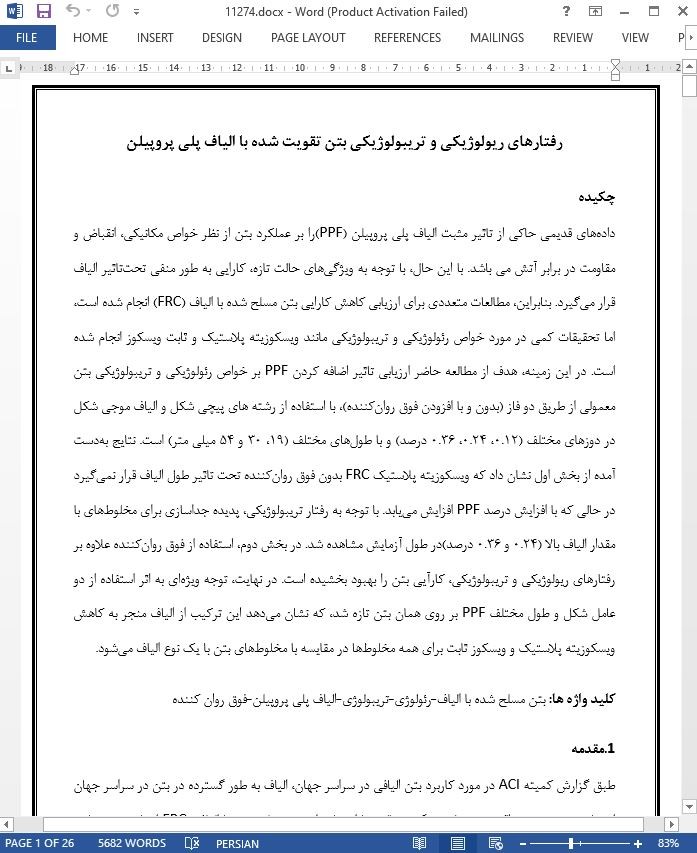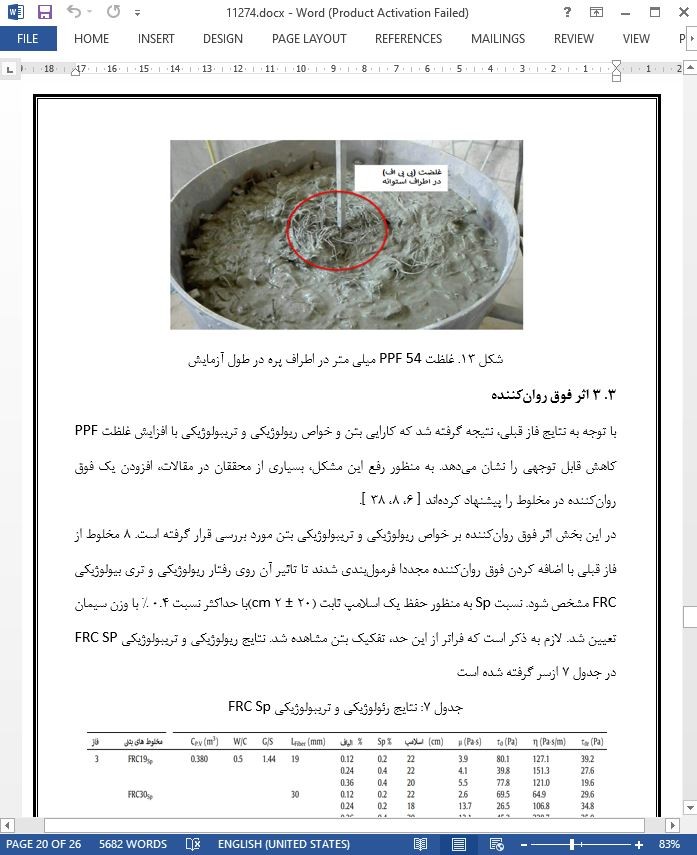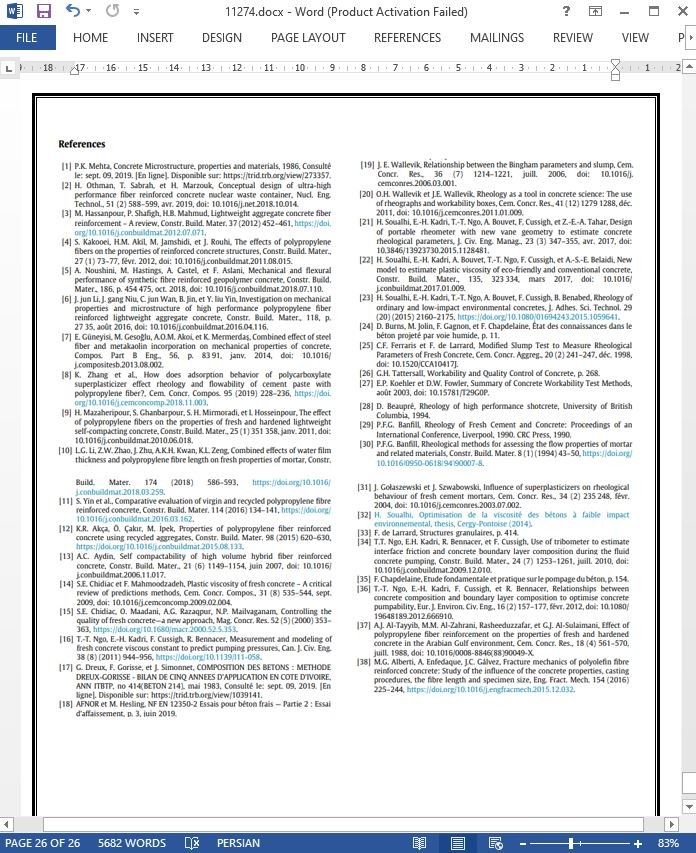
رفتارهای ریولوژیکی و تریبولوژیکی بتن تقویت شده با الیاف پلی پروپیلن
چکیده
دادههای قدیمی حاکی از تاثیر مثبت الیاف پلی پروپیلن (PPF)را بر عملکرد بتن از نظر خواص مکانیکی، انقباض و مقاومت در برابر آتش می باشد. با این حال، با توجه به ویژگیهای حالت تازه، کارایی به طور منفی تحتتاثیر الیاف قرار میگیرد. بنابراین، مطالعات متعددی برای ارزیابی کاهش کارایی بتن مسلح شده با الیاف (FRC) انجام شده است، اما تحقیقات کمی در مورد خواص رئولوژیکی و تریبولوژیکی مانند ویسکوزیته پلاستیک و ثابت ویسکوز انجام شده است. در این زمینه، هدف از مطالعه حاضر ارزیابی تاثیر اضافه کردن PPF بر خواص رئولوژیکی و تریبولوژیکی بتن معمولی از طریق دو فاز (بدون و با افزودن فوق روانکننده)، با استفاده از رشته های پیچی شکل و الیاف موجی شکل در دوزهای مختلف (۰.۱۲، ۰.۲۴، ۰.۳۶ درصد) و با طولهای مختلف (۱۹، ۳۰ و ۵۴ میلی متر) است. نتایج بهدست آمده از بخش اول نشان داد که ویسکوزیته پلاستیک FRC بدون فوق روانکننده تحت تاثیر طول الیاف قرار نمیگیرد در حالی که با افزایش درصد PPF افزایش مییابد. با توجه به رفتار تریبولوژیکی، پدیده جداسازی برای مخلوطهای با مقدار الیاف بالا (۰.۲۴ و ۰.۳۶ درصد)در طول آزمایش مشاهده شد. در بخش دوم، استفاده از فوق روانکننده علاوه بر رفتارهای ریولوژیکی و تریبولوژیکی، کارآیی بتن را بهبود بخشیده است. در نهایت، توجه ویژهای به اثر استفاده از دو عامل شکل و طول مختلف PPF بر روی همان بتن تازه شد، که نشان میدهد این ترکیب از الیاف منجر به کاهش ویسکوزیته پلاستیک و ویسکوز ثابت برای همه مخلوطها در مقایسه با مخلوطهای بتن با یک نوع الیاف میشود.
1.مقدمه
طبق گزارش کمیته ACI در مورد کاربرد بتن الیافی در سراسر جهان، الیاف به طور گسترده در بتن در سراسر جهان استفاده میشوند. در واقع، پروژههای بزرگ و جالبی با استفاده از بتن مسلح شده با الیاف (FRC ایجاد شدند، مانند پانلهای قابل تخلیه برای پارکینگ، باند فرودگاه و ظرف زبالههای هستهای [ ۱، ۲ ].
۴. اظهارات پایانی
این مطالعه به بررسی اثر PPF بر رفتار ریولوژیکی و تریبولوژیکی بتن تازه میپردازد. بنابراین ۴ سری از فرمولاسیون انجام شده است، که در آن رفتار ریولوژیکی و تریبولوژیکی بتن بدون و با اضافه کردن طولهای مختلف (۱۹، ۳۰، ۵۴ mm) و دوزهای (۰.۱۲، ۰.۲۴، ۰.۳۶ %)PPF ارزیابی شد. اضافه کردن الیاف در مخلوطها، علاوه بر ویسکوزیته بالاتر و ثابت ویسکوز، باعث افت کارایی نیز میشود. بنابراین، یک فوق روانکننده به منظور افزایش پارامترهای بتن در حالت تازه اضافه شد.
Abstract
The historical data showed a positive influence of polypropylene fibers (PPF) on concrete performance in terms of mechanical properties, shrinkage and fire resistance. However, in regards to fresh state properties, the workability is negatively affected by fibers inclusion. Therefore, several studies have been done to evaluate the workability loss of fiber-reinforced concrete (FRC), but there has been little research about the rheological and tribological properties such as the plastic viscosity and the viscous constant. In this context, the present study aims to evaluate the effect of PPF inclusion on both rheological and tribological properties of ordinary concrete through two phases (without and with incorporation of superplasticizer), using fibrillated twist and wave fibers shapes at different dosages (0.12, 0.24, 0.36%) and with various lengths (19, 30 and 54 mm). The obtained results of the first part showed that the plastic viscosity of FRC without superplasticizer is not affected by fibers length while it augments with increasing PPF percentage. Regarding the tribological behavior, segregation phenomenon was observed for mixtures with high fiber dosage (0.24 and 0.36%) during the test. In the second part, the use of superplasticizer has improved the concrete workability in addition to the rheological and tribological behaviors. Finally, a special attention was devoted to the effect of using two different shapes and lengths of PPF on the same fresh concrete, indicating that this combination of fibers leads to decrease both the plastic viscosity and the constant viscous for all mixtures comparing to that of concrete mixtures with one fiber type.
1. Introduction
According to ACI Committee report about the fibrous concrete worldwide application, fibers have been widely used in concrete all over the world. Indeed, large and interesting projects were established with the use of fiber-reinforced concrete (FRC), such as demountable panels for parking garages, runway slabs and nuclear waste container [1,2].
4. Concluding remarks
This study investigates the PPF effect on both rheological and tribological behaviors of fresh concrete. Therefore 4 series of formulation have been done, where the concrete rheological and tribological behavior was evaluated without and with the addition of different lengths (19, 30, 54 mm) and dosages (0.12; 0.24; 0.36%) of PPF. The inclusion of fibers in mixtures induced a workability loss besides a higher viscosity and viscous constant. Thus, a superplasticizer was added in order to enhance the fresh state concrete parameters.
چکیده
1. مقدمه
2. برنامه آزمایشی
1.2 مصالح
2.2 طراحی مخلوط بتن
2.3 پروتکل(روش) ازمایش و اندازه گیری ها
۲.۴. برنامه ازمایشی
۳. نتایج و بحث
۳.۱. اعتبار سنجی فرمولاسیون نموهه کنترلی (بدون الیاف)
۳.۲. تاثیر مقدار PPF، طول و شکل بر روی بتن
۳. ۳ اثر فوق روانکننده
3.4 اثر طول مخلوط PPF
۴. اظهارات پایانی
Abstract
1. Introduction
2. Experimental program
2.1. Materials
2.2. Concrete mix design
2.3. Test protocol and measurements
2.4. Testing program
3. Results and discussion
3.1. Validation of the control formulation (without fibers)
3.2. Effect of PPF dosage, length and shape on concrete
3.3. Superplasticizer effect
3.4. Effect of PPF mixed length
4. Concluding remarks
- ترجمه فارسی مقاله با فرمت ورد (word) با قابلیت ویرایش، بدون آرم سایت ای ترجمه
- ترجمه فارسی مقاله با فرمت pdf، بدون آرم سایت ای ترجمه



